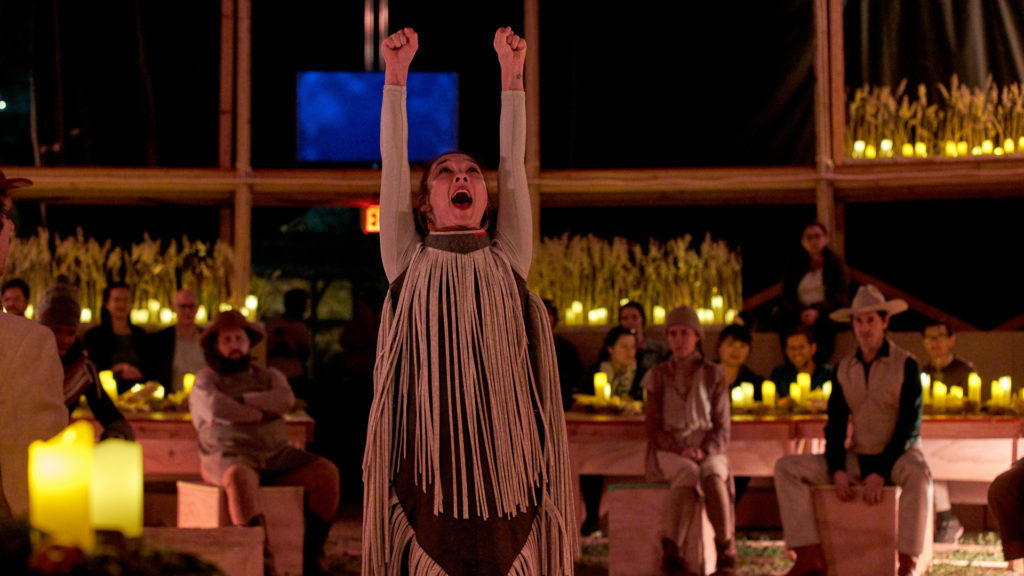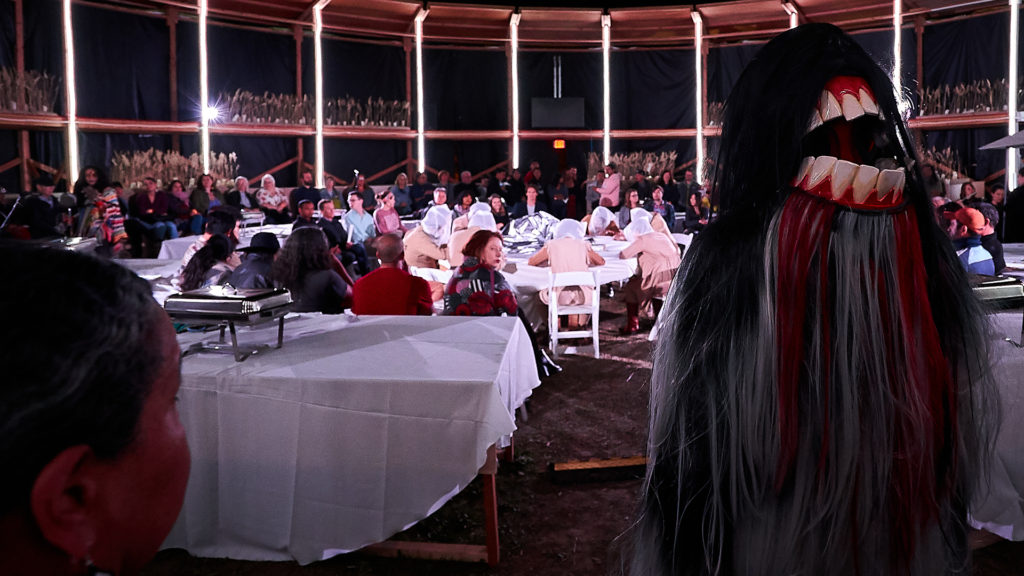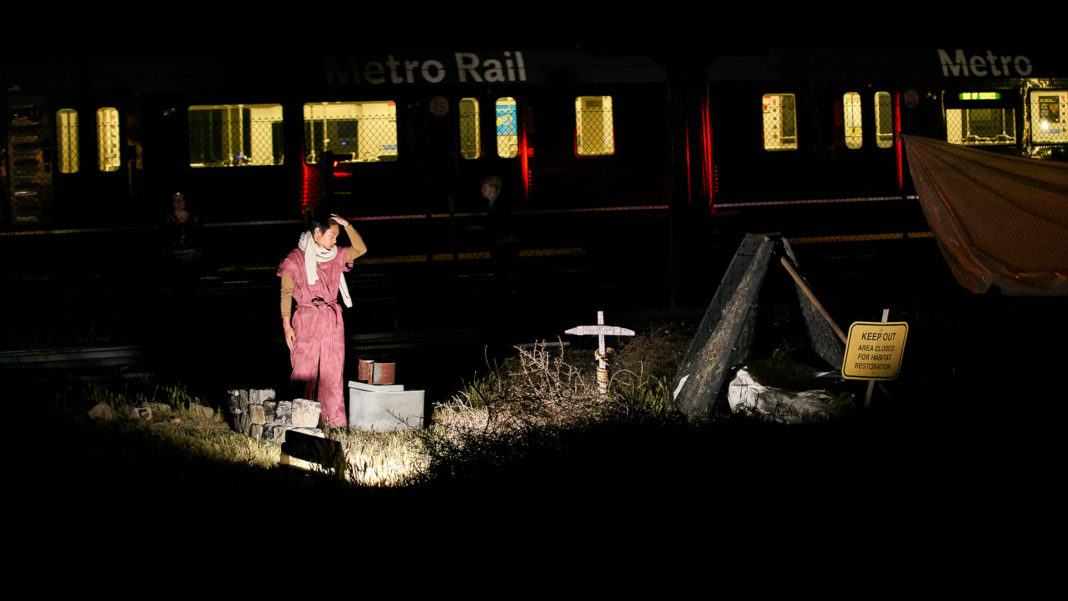When I published an interview on March 12th with Aja Couchois Duncan and Douglas Kearney, the librettists for the opera Sweet Land, none of us could have known that the Covid-19 virus would force an early closure of this challenging and important new work that disrupts some of our ideas about our own identity.
“Necessity is the mother of invention” for Yuval Sharon, Artistic Director of The Industry and co-director (with Cannupa Hanska Luger) of Sweet Land. He and the entire company came up with a plan to make sure the opera didn’t just fold up without further opportunities for audiences to experience this opera which garnered rave reviews from Mark Swed in the Los Angeles Times and Alex Ross in The New Yorker.
Sharon assembled the entire team to film both parts (Feast and Train) of the opera. Now Sweet Land, which was composed by Raven Chacon and Du Yun, can be streamed for less than fifteen dollars. The cost of purchasing this film will help offset losses incurred due to the early closure.

With the release of Sweet Land in this format, it felt like the right time to conclude my conversation with Duncan and Kearney. Remember, the answers below have been edited for clarity and length.
I read multiple takes on Sweet Land from both critics and audience members. One person said that the opera, “disrupts the dominant narrative of American identity.” If disrupting that identity was indeed a goal, what would you, as one of the creators, like that narrative of American identity to be replaced with?
ACD: I find great resonance in that description. One of the things Douglas and I talked about early on was the idea of American exceptionalism. That was something we were really interested in breaking up. In part, by just noticing that the reason so many “great things” happen in America is because land is stolen and labor is replaced. You don’t get to see they pulled themselves up by their bootstraps, but by the skin and hair of others.
DK: That domination is not abstract. That means at some level that you are a part of something in which people are often seen as resources to be exploited. You don’t have to go to slavery to think about that. You can walk down the street and see people who have jobs that have had to fight for minimum wage.
ACD: What do we want to replace that with? For me I’m most interested in the dis-ease, it’s about being disinterested in the past and the vast wasteland that is that. I want people to reconnect to land and plants and animals. The climate is accelerating at such a fast rate, it just says how much we aren’t in touch with what the earth needs. Actually reconcile with how we got here and what that means.
DK: Some of the work is going to be hard. What we have to ask is is that what we want to keep doing. If that isn’t, it’s going to take work to stop, to create a different possibility. I would like us to have an identity of reckoning with what it is that has gotten us to this moment and actually dealing with it.
There is the idea of privilege that runs through Sweet Land. For those who define privilege in strictly economic terms, what does this opera say to them?
DK: One of the things that Sweet Land talks about in terms of privilege for people whose view of privilege is more strictly speaking routed through economics, we do see a kind of extractive colonialism happening in some of the different scenes. It’s not just the settler. One of the things that’s important about Train 2, is there is a scene that Aja wrote about a kind of distance between sort of the ideal around expansion and possession and a hollowness around what that acquisition actually provides. There’s a kind of soullessness about that. Sweet Land braids and entangles so many different strands of what we might think of as categories for privilege and what we might call underprivilege.

Aja, in your poem, Fictive, you write, “There is a story we tell. A story about suffering. Not because we are suffering, but because that is the story we have been taught to tell.” How does Sweet Land fall into the category of a story you have been taught to tell?
ACD: There is a level of intergenerational trauma that I both hold and continue to re-thread into my present experience and my experience of others – because of the depth of erasure of indigenous lives in particular. That was the project. I also feel as an artist my writing is a way of evoking an alternative future. It’s not just the traumas of the past, it is weaving backwards in order to weave forwards.
Sweet Land is self-described as an “opera that erases itself.” Is that how you looked at it creatively?
ACD: I didn’t have to erase my own story. I don’t think it is in fact an erasure, but I think it gets engaged with erasure in Douglas’s sections. [He wrote Train 1 and Feast 2] I was interested in different kinds of erasures. In the libretto there were a lot of things being disrupted simultaneously.
DK: That question is something Aja and I still talk about. I gave a Sunday talk last week and I wrote a little bit about erasure and and how can you call it erasure when the bones are still there. Is that still erasure if you see bones? What we really wanted to do was show a myth being made.
To purchase Sweet Land for streaming, please go here.
All photos from Sweet Land by Casey Kringlen for The Industry/Courtesy of The Industry










